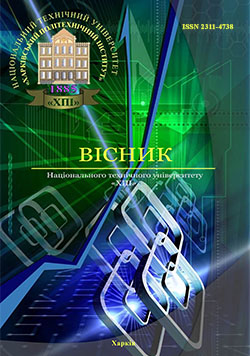PROJECT-ORIENTED APPROACH TO THE EDUCATIONAL PROCESS
DOI:
https://doi.org/10.20998/2413-3000.2016.1173.6Keywords:
organization, educational process, the project team, effectiveness, training and project bureau, managementAbstract
In the article proposed the approach to the organization of independent work of students in the university. Analyzed constraints introduction of a new system of independent work of students in project-based approach. So, traditional educational technology reveals the student's level of knowledge but not the level of competence. It is crucial to note that independent work at that - minor, auxiliary element. The student can actually qualify for the discipline and without strenuous extracurricular independent work. In turn, new educational technology is based on the opposite postulate - not to make the lecture lesson material that the student previously worked independently and did not confirm the input (previous) audits, at least, a minimum level of assimilation, which enables active participation in discussions, competitive in solving problems in conscious laboratory work, etc. Substantiates the use of project-based approach for traditional nobility shortcomings of the educational process. The result of the concept of project oriented training in educational and poly professional project teams should be staffing companies and organizations in the form of project-oriented teams of various specialists capable of solving the entire complex tasks. The paper considered organizational and methodological base implementation approach, the advantages and disadvantages of the new methodReferences
Shvindina A. A. (2011). Osobennosti upravleniya proektno-orientirovannoy organizatsiey [Features of management of project-oriented organization]. Upravlinnya proektami ta rozvitok virobnitstva : zb. nauk. pr. – Project management and production development. Collection of scientific papers, 3 (39), 10–17. Lugansk : vid-vo SNU Im. V. Dalya. Retrieved from http://www.pmdp.org.ua/images/Journal/39/11saapoo.pdf [in Russian].
Bushuev S. D., Bushueva N. S., & Yaroshenko R. F. (2010). Tsinnisniy pidhid u diyalnosti proektno-keruyuchih organizatsiy [Valuable approach in the activities of project-oriented organizations]. Naukoviy visnik mizhnarodnogo gumanitarnogo universitetu. Vipusk 1. – Scientific Bulletin of the International Humanitarian University, Vol. 1, 12–20. Odessa : MGU [in Ukrainian].
Terner Dzh. Rodni. (2007). Rukovodstvo po proektno-orientirovannomu upravleniyu [Guidance on project-oriented management]. V. I. Voropaev (Ed.). Moscow : Izdatelskiy dom Grebennikova, 552 [in Russian].
Bushuev, S.D., Haritonov D. A., & Rogozina V. B. (2013). Vektornaya model razvitiya kompetentnosti organizatsiy v upravlenii proektami [Vector model of competence development of organizations in project management]. Upravlinnya rozvitkom skladnih sistem. – Managing the development of complex systems, 14, 18–22 [in Russian].
Pavlenko O. O. GlIvenko S. V., & Luk'yanihin V. A. (2010). Vikoristannya proektnogo pIdhodu pri vprovadzhennI navchalnih InnovatsIy [Using project-based approach in implementing the educational innovations]. UpravlInnya proektami ta rozvitok virobnitstva: zb. nauk. pr. – Project management and production development. Collection of scientific papers, 1 (33), 106–112. Lugansk: Vid-vo SNU im. V. Dalya. Retrieved from http://www.pmdp.org.ua/images/Journal/33/10poovni.pdf [in Ukrainian].
Rifkin B. O. (2009). Novyih tendentsiyah v vyisshem obrazovanii SShA [On the new trends in USA higher education]. Vyisshee obrazovanie v Rossii. – Higher education in Russia, 5, 123–135 [in Russian].
Gure L. I., Kirsanov A. A., Kondratev V. V., & Yarmakeev, I. E. (2006). Integrativnyie osnovyi innovatsionnogo obrazovatelnogo protsessa v vyisshey professionalnoy shkole: monografiya [Integrative framework of innovative educational process in higher vocational school: monograph]. V. V. Kondratev (Ed.). Moscow : VINITI, 288 [in Russian].
Zakon Ukrayini "Pro InnovatsIynu dIyalnIst" [The Law of Ukraine "On Innovation Activity"]. zakon4.rada.gov.ua. Retrieved from http: // zakon4.rada.gov.ua/laws/show/40-15 [in Ukrainian].
Androschuk G. O., Zhilyaev I. B., & Chizhevskiy B. G., et. al. (2009). Strategiya innovatsiynogo rozvitku Ukrayini na 2010–2020 roki v umovah globalizatsiynih viklikiv [The strategy of innovative development of Ukraine for 2010–2020 in the conditions of globalization challenges]. Kiev : Parlamentske vid-vo, 632 [in Ukrainian].
The Global Competitiveness Report 2012–2013. (2013). WEF_GSR_Report_2012-13. Retrieved from http:// WEF_GSR_Report_2012-13.pdf.
Nakaz MON Ukurayini № 635 vid 29.05.2013 r. "Schodo zatverdzhennya primirnogo polozhennya pro akademIchnu mobilnist studentiv vischih navchalnih zakladIv Ukrayini" [Order of the Ministry of Education and Science of Ukraine, No. 635 from March 25, 2013. "On approval of Regulations on academic mobility of students in higher educational institutions of Ukraine"]. (2013). mon.gov.ua. Retrieved from http://www.mon.gov.ua/img/zstored/files/635.docx [in Ukrainian].
Gidnim abiturientam – yakisnu osvitu "Doslidzhennya uspIshnosti navchannya studentIv pershogo kursu" [Worthy entrants – qualitative education "Research on teaching success of the first-year students"]. kpi.ua. Retrieved from http://kpi.ua/1014-8 [in Ukrainian].
Hanushek, E., & Wößmann, L. (2007). The Role of Education Quality for Economic Growth. World Bank Policy Research Working Paper, Vol. 4122. Retrieved from https://openknowledge.worldbank.org/bitstream/handle/10986/7154/wps4122.pdf?sequence=1.
Downloads
Published
Issue
Section
License
Copyright (c) 2016 Олександр Михайлович ТЕЛІЖЕНКО, Вадим Олександрович ЛУК’ЯНИХІН, Наталія Олегівна БАЙСТРЮЧЕНКО

This work is licensed under a Creative Commons Attribution-NonCommercial-ShareAlike 4.0 International License.
Our journal abides by the Creative Commons copyright rights and permissions for open access journals.
Authors who publish with this journal agree to the following terms:
Authors hold the copyright without restrictions and grant the journal right of first publication with the work simultaneously licensed under a Creative Commons Attribution-NonCommercial-ShareAlike 4.0 International License (CC BY-NC-SA 4.0) that allows others to share the work with an acknowledgement of the work's authorship and initial publication in this journal.
Authors are able to enter into separate, additional contractual arrangements for the non-commercial and non-exclusive distribution of the journal's published version of the work (e.g., post it to an institutional repository or publish it in a book), with an acknowledgement of its initial publication in this journal.
Authors are permitted and encouraged to post their published work online (e.g., in institutional repositories or on their website) as it can lead to productive exchanges, as well as earlier and greater citation of published work.

